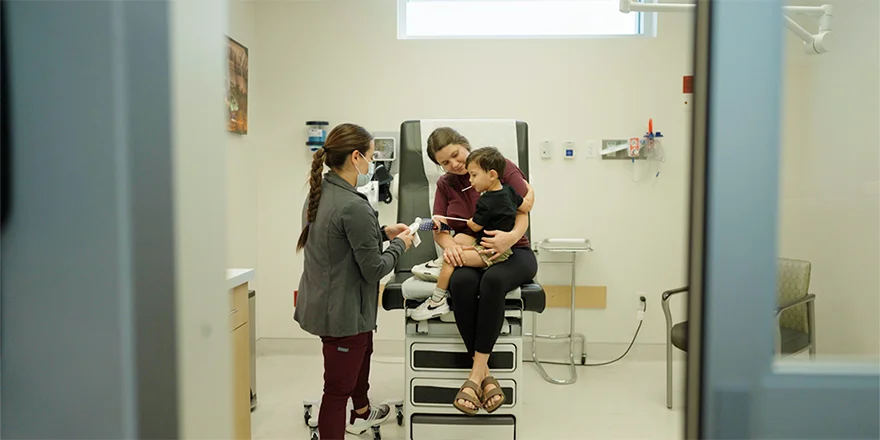Riding your first rollercoaster. Going on a blind date. Ordering from a menu in a language you can’t read. There are some things that can make your stomach churn and your palms sweat. For many, going to counseling for the first time is the same type of experience.
To make it a little less uncomfortable, we’re answering a few questions you might have, including: What is counseling? What do I look for in a therapist? What is therapy like? Hopefully, you’ll feel a little braver as you find a counselor.
What Is Counseling?
Mental health counseling and behavioral health counseling are processes in which individuals seek support from a professional counselor to improve their emotional well-being or change their behavior patterns. It’s an opportunity for people to talk about their thoughts, feelings, behaviors and experiences in a safe and confidential environment. Counseling can help anyone who is struggling with mental health concerns or behavioral health concerns.
Behaviors and Challenges a Counselor Can Help:
- Anxiety
- Depression
- Trauma
- Stress
- Relationship issues
- ADHD symptoms
- Substance abuse
- Marriage and relationship challenges
- Parenting
- School difficulties
- Career changes
Counseling is an effective way to improve mental health, emotional well-being, behavioral health and relationships. Counseling exists to support you! However, people often delay finding a professional counselor for various reasons.
A Few Reasons People Put Off Finding a Therapist:
- Difficulty acknowledging a need for help
- Stigma concerning professional counseling
- Fear of the unknown
- Concern about the costs
- Unsure how to find a counselor
- Limited availability
- Lack of time
Our recommendation–don’t wait! Counseling is much less intimidating than you might think, and it can make a real difference in your life.
Whether you have decided to find a counselor or have questions about therapy, the next step is to call or send a message to start a conversation with a behavioral health provider. We provide in-person and telehealth counseling in Oklahoma.
Counselor Vs. Therapist, Therapy Vs. Counseling
The language used to describe mental and behavioral health care can be very confusing. Common terms to describe counseling include mental health, behavioral health, wellness, psychotherapy, therapy, consulting, and others. While these terms have slightly different technical meanings, for the most part, these terms are used interchangeably. Don’t be intimidated by the language; here’s what you need to know.
Are a Counselor and a Therapist the Same Thing?
Counseling professionals are commonly called counselors, therapists, consultants, mental health providers, behavioral health providers or clinical social workers. Professional counselors usually have a master’s or doctorate and a license to practice clinical mental health counseling. The “L” in their abbreviations stands for “Licensed.” So, before you book your first counseling session, you’ll want to look for someone licensed.
Common licenses for professional counselors include:
- Psychologists (PsyD or PhD)
- Clinical social workers (LCSW)
- Professional counselors (LPC)
- Marriage and family therapists (LMFT)
- Mental health professionals (LMPH)
- Alcohol and drug counselors (LADC)
- A few others
What to Look for in a Counselor
Regardless of the type of therapist you find, building a therapeutic relationship with your counselor is one of the most important aspects of counseling. Therapy is very personal, so you will want to seek a counselor who creates a positive environment.
A Positive Counseling Environment:
- Feels comfortable
- Creates trust in your counselor
- Allows you to communicate your thoughts and feelings openly and honestly
- Feels safe, supportive and non-judgmental
Remember, It’s Confidential and Private
Strict ethical and legal standards protect the information you share with your counselor. Your counselor must maintain the confidentiality of your information, except in cases where you are at risk of harming yourself or others. So you can feel confident in the safety and security of the information you share!
What to Expect in Counseling
Getting Started in Counseling
The first steps to getting started in counseling are:
- Connect with a provider. Xpress Wellness Behavioral Health provides counseling in Oklahoma. Contact us by calling 405-493-6455 or reaching out online.
- Ask questions and schedule an initial consultation.
- Provide your basic information, like insurance, contact information, and a general reason for counseling. Make your provider aware of any preferences or special needs.
- Remember, you don’t need to provide much detail about why you’re seeking counseling until your initial consultation. So don’t sweat it!
If you’ve made that call already, congratulations! For many people making the first therapy session appointment is the biggest obstacle.
Your First Counseling Appointment
Your first session is the initial consultation or intake session. (Sounds a little scary? We promise it’s not!)
Counseling is a collaborative process. You will work together towards the goals you decide to work on, and your therapist will not judge you or force you to do or discuss anything that you aren’t comfortable doing or discussing.
What do you talk about at your first counseling session?
You will probably discuss the following:
- Your reasons for seeking counseling
- Current and past mental health
- Relevant medical history
- How you have dealt with similar issues in the past
- Relevant life experiences
- Your counselor will explain the counseling process
This initial consultation helps the counselor better understand your needs to develop a plan of action that works best for you. It’s common to feel anxious during your first counseling session, but remember that your therapist is there to help.
Setting Goals for Therapy
At the end of your first counseling session, you will develop treatment goals and discuss a schedule for follow-up appointments.
Some examples of counseling goals may include:
- Reducing symptoms of anxiety or depression
- Improving relationships
- Increasing self-esteem
- Managing stress
- Adjusting to physical illness
- Increasing your personal effectiveness
- Reducing the adverse effects of past or current traumatic experiences
Your mental or behavioral health counselor will help you identify your goals and will help keep the counseling on track to meet these goals.
Counseling Follow-up Sessions
Follow-up sessions allow time for in-depth conversations and therapeutic techniques to help you reach your goals.
At Xpress Wellness Behavioral Health, our behavioral health counselors book appointments at regularly scheduled times convenient for you. Sessions are usually about 30 minutes. Most of our services are telehealth visits done by video on your phone or computer, but we only provide counseling in Oklahoma at this time. At some of our clinics, we also have in-person counseling. Telehealth counseling is available to clients anywhere in Oklahoma.
Length of Treatment
The length of your counseling treatment will depend on your specific needs and goals. Some people may benefit from short-term counseling, which can last a few weeks or months, while others may need longer-term treatment to address more complex mental health concerns.
Ending Treatment
Usually, you have developed a strong relationship with your therapist, and ending this relationship can be just as awkward or difficult as starting. It can feel like breaking up with someone you care about!
Discuss your progress with your counselor frequently and decide together when you have made enough progress to stop counseling.
How Does Therapy Work?
Your counselor should use evidence-based and practice-informed therapeutic techniques to help you achieve your treatment goals. These treatment approaches have been proven through scientific research and clinical studies.
Types of Therapeutic Techniques:
Examples of evidence-based therapeutic techniques include:
- Cognitive-behavioral therapy (CBT)
- Dialectical behavior therapy (DBT)
- Eye movement desensitization and reprocessing (EMDR)
- Interpersonal therapy (IPT)
- Solution-focused brief therapy (SFBT)
- Mindfulness-based stress reduction (MBSR)
- Among many others!
These therapies have been extensively researched and are effective in treating a variety of mental health conditions. Your therapist can explain each of the techniques they use. Our practitioners use many of these techniques for counseling in Oklahoma.
How Can I Make the Most of Counseling?
- Active participation – You’ll have to engage in conversations, reflect on your thoughts and feelings, and practice new coping strategies. You should share your experiences and ask questions.
- Homework and self-reflection – Your counselor may assign homework for you to complete between sessions. This may include journaling, reflecting, reading self-help materials, or practicing new coping strategies. Successful therapy often depends on your willingness to practice new skills and work on your goals in-between sessions.
Counseling is a valuable tool for individuals struggling with mental health or behavioral health concerns. Whether you’re dealing with anxiety, depression, relationship conflicts, stress or other emotional issues, counseling can provide the guidance you need. The behavioral health team at Xpress Wellness would love to help!
Please contact us if you have additional questions or are interested in finding a counselor.



